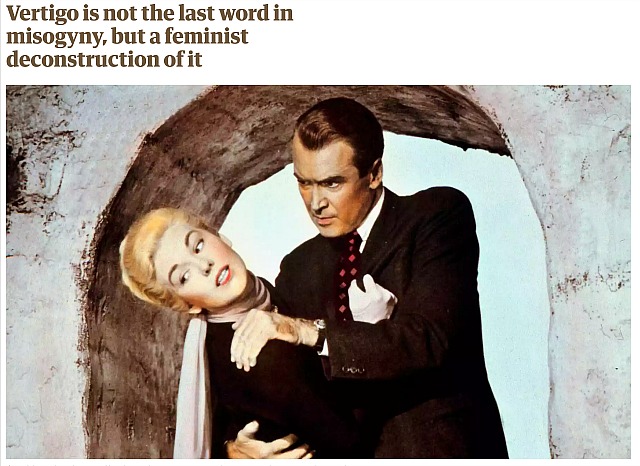
I will always fight, with every last fiber of my being for Alfred Hitchcock's "Vertigo," a movie which I consider to be the greatest of all-time.
A few weeks ago, I did, however, ask readers to consider David Thomson’s 6.21 London Review of Books essay (“Vertigo After Weinstein“), which made the outrageous case that Hitchcock's masterpiece hasn't age well because of its "male gaze" perspective, even going as far as using the word "predator" to describe Hitchcock's intent in the film. Yes, it was Thomson basically sayingthat our post-Weinstein world should disapprove of Hitchcock's classic.
Pff, give me a break.
As I mentioned in that article:
"Thomson's lost his mind. He's clearly politicizing a great movie, saying it hasn't aged well because Twitter would surely deem it sexist, a male-gazing love-affair. I still think "Vertigo" is the greatest movie ever made. The film is such a profoundly beautiful statement. Its dream-like atmosphere, about two people who are not sure who they are, but keep looking for answers, can easily be the same description used for David Lynch's "Mulholland Drive." It's one of the 4 or 5 most transcendent cinematic experiences I've ever had."
"We live in an age when everything needs to be politicized. Even renowned film scholars like David Thomson, whose writings I studied and admired during my tenure at film school, has decided that "Vertigo," well, it's just not "woke" enough for today's world."
I can only do so much in my defense of Hitchcock and "Vertigo," with Jeffrey Wells also writing an impassioned plea to stop the hysterics.
In a 6.28 The Guardian article, Anne Billson counter-argues Thomson, even if she doesn't necessarily mention him by name, and claims that Hitchcock celebrated women in his movies, making them the heroines, the ones with a pure soul and that the men were weak:
“For a so-called misogynist, his films feature a lot of intrepid heroines,” Billson writes. “Even when the women are nominally just love interests, they are unusually plucky and quick-witted.”
“While some critics see the film, released 60 years ago, as proof of Hitchcock’s sexist creepiness, a closer look reveals that strong women and weak men were often at the heart of his work.
She is correct with that assessment.

The gist of Thomson's article was to acknowledge his doubts that "Vertigo"could remain #1 when Sight & Sound critics vote again in 2022. The poll is the most celebrated and prestigious of film polls. There is none more important. In 2012 "Vertigo" dethroned Citizen Kane's 50 year reign at the top.
The results were as follows:
Vertigo (191 mentions)
Citizen Kane (157 mentions)
Tokyo Story (107 mentions)
The Rules of the Game (100 mentions)
Sunrise: A Song of Two Humans (93 mentions)
2001: A Space Odyssey (90 mentions)
The Searchers (78 mentions)
Man with a Movie Camera (68 mentions)
The Passion of Joan of Arc (65 mentions)
8½ (64 mentions)





